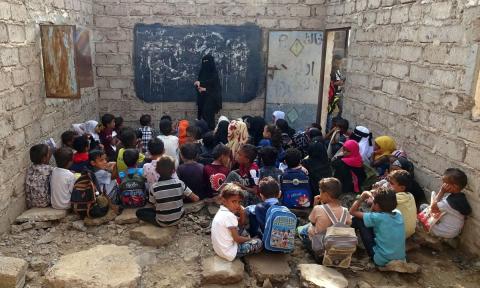Will Biden have courage on child soldiers?


In late June, the Biden administration released the first Trafficking in Persons Report of its presidency. This annual report includes a list of countries identified by the U.S. State Department as having government forces or government-supported armed groups that recruit or use child soldiers.
The list is mandated by the Child Soldiers Prevention Act (CSPA), a landmark piece of legislation that leverages U.S. military assistance and arms sales to encourage governments to stop using child soldiers. Countries included on the CSPA list are prohibited from receiving certain types of U.S. arms sales and military assistance the following fiscal year.
Since 2010, this annual report has highlighted 21 countries that recruit or use child soldiers. Fifteen countries — a record high — were included on this year’s CSPA list, including three — Pakistan, Turkey, and Venezuela — that appeared on the list for the first time. Most of the countries listed are habitual violators of international legal prohibitions against the recruitment and use of children in armed conflict. Twelve previously-listed countries made repeat appearances this year — Afghanistan, Burma (Myanmar), the Democratic Republic of the Congo, Iran, Iraq, Libya, Mali, Nigeria, Somalia, South Sudan, Syria, and Yemen. Five of these countries have appeared on the CSPA list for ten years or more — Somalia, Yemen, the DRC, Burma, and South Sudan. Notably, this year’s list does not include Sudan, which has been listed all but one year since the list’s origination.
The unfortunate reality is that despite these abusive governments repeatedly appearing on the CSPA list, there have been few consequences. Since the law took effect a decade ago, governments have rarely been denied arms sales or military assistance as a result of the CSPA. Our research reveals that a staggering 97 percent of arms sales and military assistance that could have been withheld from CSPA-listed countries has been ultimately provided. More than $5.9 billion in U.S. weapons, equipment, assistance, and training has been allowed to flow to countries that continue to engage in violations against children. These and other insights are captured by the Stimson Center’s new Child Soldiers Prevention Act Implementation Tracker, which allows users to explore the continued flow of U.S. arms and military assistance to countries using child soldiers and evaluate the law’s impact — or lack thereof — on a country-by-country basis.
While the CSPA subjects listed countries to arms sales and military assistance restrictions, it also allows the president to waive these prohibitions if doing so is deemed to be in the “national interest” of the United States. This clause, intended to afford presidents a degree of flexibility to entice governments to take steps to address the issue of child soldier recruitment and use, was used by the Obama and Trump administrations to waive virtually all of the law’s prohibitions and to strip it of nearly all of its potential to leverage a change in abusive governments’ behavior.
The Biden administration deserves credit for their willingness to call out a record number of countries in this year’s CSPA list — including several close U.S. partners — for exploiting children in armed conflict. But the administration’s first real opportunity to demonstrate its commitment to protecting the world’s most vulnerable population lies ahead. At the end of September, the administration will announce “national interest” waivers for countries identified on this year’s CSPA list. By limiting the use of those waivers, the Biden administration can send a signal to the perpetual violators of international law that abuse of children will not be tolerated. A strong message from the outset will encourage governments to get serious about ending this despicable practice and gaining access to much-coveted U.S. weapons and military assistance. The Biden administration should implement the CSPA as it was intended and exercise courage in challenging those governments that openly flout human rights protections within international law.
The Hill

Yemeni officials on Monday condemned arrests and prosecutions by the Iran-backed Houthi militia directed against media, journalists and celebrities…

Yemen's warring parties are gearing up for new waves of conflict in 2023 amid a lack of decisive steps towards sustainable peace, adding to the suf…

The UAE will help to recruit doctors and deliver crucial supplies for hospitals in Yemen under a major healthcare drive. The Khalifa bin…